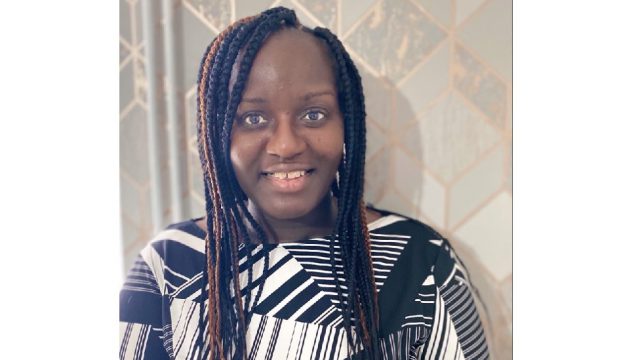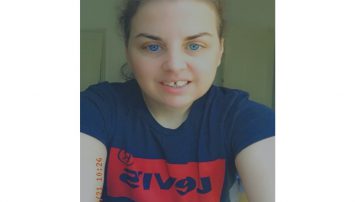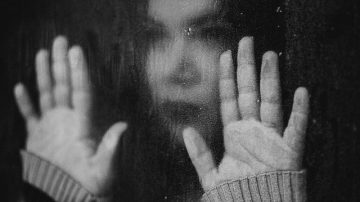Ursula Myrie and Her Personal Journey
Trigger warning: references to sexual, physical, mental, emotional, and psychological abuse.
I am a survivor of historic rape, sexual, physical, mental, emotional, and psychological abuse. In my community it’s common because parents, grandparents and great- grandparents have been abused themselves so it’s something we don’t talk about it or we hide it under the guise of culture or/and religion. As a child I was told I had to be raped because I had demons inside me and you can’t argue against that otherwise you would be punished.
I saw my psychiatrist when I was 7 years old because I was self-harming from the age of 7 but I wasn’t properly diagnosed until I was 33, when I found out I had Borderline Personality Disorder (BPD). I went home and googled it and I ticked all the boxes. It was like a whole world opened up to me because I realised what was wrong with me. The roots of BPD comes from childhood abuse and traumatic past. So, I traced it back to my childhood when I was sexually abused and raped repeatedly between the age of 2 and 16.
Until the age of 33 I was told I was a mad black woman and that I was possessed by demons but after the diagnosis, I realised that I was neither mad nor possessed by demons and I knew I needed help. But the problem was the solution offered to me, by predominantly white mental health services with a one size fits all approach to mental health, did not work for me. I had to go inside myself and fix it myself. I chose to free myself from family and religion.
I have been sectioned multiple times over the years and every time I was sectioned it was the same issue – I was seen as more angry and more violent than the other non-black people on the ward. Where the white people’s behaviour on the ward was passed off as passion and anxiety, I was labelled as angry, threatening, and aggressive. But I was anxious as they were anxious. My anxiety was presented different to them because they didn’t understand my history, my culture, my faith, my beliefs, or my trauma. So they over- medicated me to keep me quiet and not ask for the help I needed.
Over the years this hasn’t changed. I have realised that black people are over subscribed in the mental wards, the proportion of black children being excluded from school is increasing, the amount of black people in prison is increasing, especially children or prisoners with mental health issues.
I have recognised 2 things here:
- We have a problem in the black community, in that we don’t think mental health issues exists, which they clearly do;
- The statutory services that are meant to support us are not fit for purpose. They are not culturally sensitive, culturally appropriate or culturally competent.
That’s why I decided to set up Adira. I think of it as a bridge organisation between people in the African-Caribbean community with mental health difficulties, and the predominately white mental health services.
Stories from ADIRA
ADIRA is a survivor-led mental health and wellbeing service that supports black people with mental health issues. The whole reason why ADIRA was set up was mainly because of the gaps in Mental health services. I can’t talk about other communities that’s why I don’t like the term BAME because we are not one single community. I can only talk about the black community.
ADIRA had to be set up because we were falling between the gaps because part of the problem is many black people don’t believe in mental health and behind closed doors we say that’s white people’s problem while we yet populate the mental health wards and prisons.
Black people with mental health difficulties come to us first and the reason they come to us first is because we understand what’s going on. For example, if someone comes here and tells me ‘someone has put juju on me’, I am not gonna be like ‘what is juju?’ If they go to a white person as soon as they ask what’s juju, the conversation is over because if you don’t know what’s juju how are you going to understand me. If I tell you my pastor has said I’m possessed by demons, unless you understand my faith, my religion, my culture, my beliefs, you can’t understand and help my mental health. They come to us for a help which is culturally appropriate, culturally sensitive, and culturally competent for them.
At the same time we can be a tool for the white community who approach us in a genuine and right way. We say NO to some white people because their approach is wrong. They use us for our knowledge, lived experience, and trauma and only pay us lip service or use our skin colour to tick boxes. It’s about building trust and friendship like the relationship we have with Sheffield Flourish, for example, we see them as an ally because they approached us in a right way, they genuinely wanted to get it right and change things, so we involve them in everything Adira does.
When we create safe spaces for black people, we don’t want it run by white people because we can’t say what we want, behave how we want, we don’t want to be used for ticking boxes. Let’s go back to 20 years ago when the government started to acknowledge we were overpopulating mental health hospitals. They sent white middle-class men with suits and briefcases into the black community to say ok you’ve got a problem and this is how we gonna fix it with the one size fits all approach. First we [the community] looked at them and said we don’t believe in mental health, if you know us you would know that, and secondly who the hell are you? We haven’t seen you before in our communities and thirdly your approach is wrong, coming here with a suit and looking very middle-class in the most deprived communities, open your briefcase and bring out some leaflets and tell us how you are going to fix our mental health.
We didn’t trust them and didn’t want to talk to them. They went away and that’s where the terms ‘hard to reach’ and ‘difficult to engage’ came from. Never ever say to a person of colour they are ‘hard to reach’ because you gave us that label. The language is important. We are not difficult to reach or work with.
I remember one day watching TV and Theresa May went into the parliament and asked why there are so many black people on mental health wards? And I think that’s when they decided to think about diversity, not because they cared about the black community and how mental health was affecting us, but more because we were costing the government money, as it is very expensive to house people on the mental wards. Then all of the sudden, white organisations started coming to us saying we want to engage with you.
It’s all about trust. Our mistrust goes back to slavery, but it still exists mentally today in 2020. By stopping us having a voice, or getting promotions, being discriminated against, racially targeted, and murdered because of the colour of our skin everyday. Mentally we are still being slaved as you see everyday racism and bias controls how we live, eat, walk, talk, work, and raise our children.
Over time, something like George Floyd happens and there is a knee jerk reaction from the white community to do something and it’s like ‘Look everybody we are doing something’, and then as soon as it dies down they take away all the things and resources until the next George Floyd happens. The trust has constantly and consistently been broken. That’s where the mistrust comes from. They use us and discard us whenever it suits them.
The situation for black men is even worse. We teach our men from the womb to be strong and by strong we mean angry and not to be soft and be prepared for pain. They are not allowed to cry or show emotion. They are told they are useless or stupid or worthless because that’s what they gonna hear from the white man outside so they need to be ‘prepared’ for the real world. So by the time that boy leaves home he is angry, hurting and there is nowhere for his pain to go. And it horrifically affects their mental health.
There is a saying that it takes a village to raise a child, but it doesn’t end there, the second part says the child who is not embraced by the village will burn it down to feel its warmth. And that is what’s happening now, if the village (society) doesn’t care about the child’s mental health and wellbeing and ignores him, the child does everything (stabbing, shooting, being part of a gang, etc) and says ‘do you see me now’? Because that’s when I get your attention, when I stab somebody, when I come home pregnant at 15. Can you see me now, I am burning down the village?’ This is why we see the rise of mental health problems in young black people.
But this generation have started asking questions and are willing to get help but unfortunately the current systems we have in place isn’t working for them. It’s working against them at every turn.
I was mad at Sheffield Health and Social Care because, for example, they say IAPT [Improving Access to Psychological Therapies] do this, IAPT do that. But there are so many young black males coming to me and say they contacted IAPT but they were sent back to their doctor and again sent back to IAPT. This is the problem, they don’t make services culturally appropriate, or culturally competent.
The young people (there are around 50 of them) tell me they want to talk to a black mental health therapist. A few weeks after we did the Black Mental Health live, a mum contacted me and said her son was back home from Uni because of Covid and the first day he arrived he had a complete mental health breakdown because of a racist incident he had experienced at the uni. He locked himself in his room and threatened to kill himself and other members of the family because he thought they wanted to kill him. For a few weeks the mum had talked to the doctors and they had recommended antidepressants and she had called the crisis team several times. The mother had called them but they had passed her back to the doctor, the doctor referred them to IAPT, and they passed them back to the doctor and again to the mental health team. So the mum was scared that her son would either kill himself or the family and asked me if there is anything I could do.
I rang the people at SHSC [Sheffield Health and Social Care NHS Foundation Trust] and talked to them, and 20 minutes later the mother called me and said ‘I don’t know what you did but thank you, they are helping my son’. The only thing that helped that mother was that I knew people at the top at SHSC and told them listen this is happening so fix it. But it isn’t my job and responsibility to do this every time.
ADIRA isn’t a crisis organisation. What would have happened if I didn’t have that access to people at SHSC? This mother tried everything and this is the proof that the system doesn’t work for the black community.
Four weeks ago a 19 years old black young man killed himself. Recently a 20 year old called me and asked me if I knew of any black male therapists because he was struggling but the private therapist, even the cheapest one, charges £45 per hour and he couldn’t afford it. So I had to call SHSC again and told them if this one kills himself too I would publicly hold them and IAPT responsible. He wanted to get help before ending up at a mental health ward.
Ursula’s Feedback on Mental Health Surveys
For a survey to work you need to build relationship with people of colour. Not once or twice a year sending out some surveys to tick boxes. How do you expect people to trust you and talk about their lives in one or two hours, relive their mental health journey, their traumatic experiences, and share it with a stranger?
We are people with lived experience and want to know what do you do with our stories, what is the result of all these surveys? We never knew what would happen to them. That’s again when trust and mistrust comes in.
You can’t put a price on my lived experience, no PhD teaches you the expertise of a person with lived experience. So when you expect people with lived experience to spend time on your surveys you should treat them equally and pay for their time as you pay a person with a degree or PhD.
What is the purpose of all these surveys anyway? Why do they come back with exactly the same questions each year and we see no improvement in the system?



